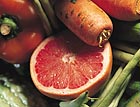Best vegetable box schemes
Ordering fresh fruit and vegetables direct from local farmers has never been easier – we recommend some of the best providers around the country


Sales of organic produce through box and mail-order schemes more than doubled last year. Some 400,000 households regularly received a box of locally grown fresh fruit and vegetables, says the Soil Association. But what exactly are box schemes and how do they work?
Box schemes: the beginning
Buying fresh produce, be it fruit, vegetables, meat or diary products, directly from farmers and growers is not a new phenomenon. However, box schemes as we know them today, where these farmers and growers have made it their business to sell their produce directly, and often solely, to local residents, began in earnest in 1991 with Devon organic vegetable growers and box scheme pioneers Tim and Jan Deane. At that time, the wholesale market was unstable, explains Mrs Deane. Most organic businesses were going bust. When our local co-operative closed, we had to think of another way of selling our vegetables. We canvassed our local village and asked if they would be interested in a box scheme. Within two years, we were solely selling vegetable boxes. The Deanes took their success story on the road, and, through a series of conferences with the Soil Association, helped kick-start the organic box-scheme movement. Today, small growers to large farming co-operatives are selling their produce through such schemes.
How they work
Contents: There are as many varieties of box schemes as there are wonderful vegetables in them. However, the majority sell only organic produce, which can range from set-content boxes of seasonal vegetables to combinations from meat to dairy and wines to washing-up liquids. Few schemes sell only home-grown produce. Most source additional stock from other local, organic growers (the Deanes now only sell their vegetables to nearby Shillingford Organics, outside Exeter: 01392 832729; www.shillingfordorganics.co.uk). Some fruits are imported. These are usually shipped in rather than air-freighted. And most good schemes ask for a list of up to three vegetables you don t like which they swap for something else.
As well as produce, many schemes include recipe ideas for some of the more unusual vegetables in their boxes, a service Jane Blaker from Wiveliscombe has found very useful since she began ordering her weekly box from Spring Grove Market Garden in Milverton some five years ago. I ve never had a problem knowing what to do with the different varieties of vegetables because there s always information about them and recipes in the box, she explains. In fact, the variety is very good for our diet a sentiment also shared by loyal box schemer Liza Dibble of Eastrop Farm near Highworth. We eat a greater variety of vegetables since we started getting our boxes from Coleshill Organics near Swindon four years ago, she says. Getting lots of different vegetables makes you more adventurous with your cooking and you find yourself reaching more often for your recipe books.
But it s more important for Mrs Dibble to know the provenance of her food. Knowing where our food comes from and that it s organic and fresh is paramount if we get salad in our box, we know it s been picked that morning and not, like supermarket salad, been chemically treated so it can last 10 days on a shelf. It s also really important to support British growers producing seasonal vegetables. I m not worried if I can t get strawberries at Christmas.
Sign up for the Country Life Newsletter
Exquisite houses, the beauty of Nature, and how to get the most from your life, straight to your inbox.
Ordering: After 16 years of trading, box schemes have become quite sophisticated. Today, most orders and payments can be made over the internet on individual scheme providers websites where they hold comprehensive lists of their produce. Of course, orders still be placed over the telephone, fax, in person, or even left under the doormat.
Deliveries: Individual schemes delivery areas also vary from just a four-mile radius (like Spring Grove Market, Somerset) to co-operatives covering much of the country (Riverford Organics in Devon). Most boxes are delivered to your door, but some schemes drop off orders at central collection points which, says Mrs Blaker, is just as convenient. I can collect my box any time after 4pm on a Friday and only have to pop over the road to get it. This is great, because I don t have to drive and, although I work full-time, I know I ll have my weekly supply of fresh fruit and vegetables.
Frequency: In most cases, deliveries are made once a week. Some schemes offer next-day delivery provided you place your order the previous morning.
Commitment: Some schemes encourage customers to place regular weekly or monthly orders. In the case of Com-munity Supported Agriculture schemes (CSAs) where local people can invest in their local farm in some way in return for a share of the harvest members are asked to commit in advance, in cash or in kind (working on the farm), to buying their food directly from the CSA farm.
Cost: Box schemes are very competitively priced, coming in cheaper than organic supermarket produce, and often conventional supermarket produce too. Most basic boxes of six or so types of fruit or vegetables start from about £7. Some schemes ask for a minimum order and/or charge a delivery fee.
Merits: Locally grown organic produce is not only fresh and tasty, but also traceable. By buying your fruit and vegetables from nearby growers, it reduces the number of miles the produce travels, plus organically farmed food is proven to produce less carbon. It was recently calculated that the food grown at Tolhurst Organic Produce in Oxfordshire, a 17-acre plot, creates just eight tons of carbon a year to produce and supply fruit and vegetables to 400 customers over a 25-mile radius the same quantity of carbon as a standard household.
How to find your local box scheme
Search the internet. Several websites provide a useful postcode finder service listing all the schemes in your area. A good place to start is on the Soil Association s website at www.soilassociation.org/directory. It also publishes The Organic Directory (£8.95 from www.greenbooks.co.uk). Of course, not all box schemes have organic accreditation. Organic and non-organic schemes are listed on www.vegboxschemes.co.uk, set up in 2006 by friends and colleagues Jos Dewing and Simon Deverell, who both work in internet marketing. We decided to set up the site last September when we saw how excited about vegetables our young children suddenly became when we started getting ours delivered by our local scheme outside Brighton, says Mr Dewing. To date, they have some 450 schemes registered. To find and support your local CSA scheme, visit www.cuco.org.uk
Some of the best by region
South-East: Tolhurst Organic Produce, Hardwick Estate, Pangbourne, Berkshire (0118 984 3428). Iain Tolhurst s box scheme operates within a 25-mile radius of his farm and delivers to collection points.
* Warborne Organic Farm, Hampshire, (01590 688 488; www.warbornefarm.co.uk) supplies 370 boxes to Lymington and surrounding districts. Customers receive a weekly selection of seasonal vegetables chosen from the 300 varieties grown on the farm.
South-West: Riverford Organic Vege-tables, Buckfastleigh, Devon (01803 762720; www.riverford.co.uk) is one of the UK s largest box-scheme operators. It s part of the South Devon Organic Producer group, a co-operative of 13 family-run farms in south Devon, who share their machinery, labour and knowledge of growing organic vegetables. Riverford also has sister farms: River Swale in North Yorkshire, River Nene in Peterborough and Riverford Norton in Hampshire. Free deliveries are made once a week.
* Spring Grove Market Garden, Milverton, Somerset (07956 429531) grows 95% of the produce for its boxes on three acres of land where it has planted hedges, native fruit and nut trees, set up a beehive and keeps 50 laying hens. The business supplies 80 customers each week within a four-mile radius.
* Coleshill Organics near Swindon, Wiltshire (01793 861070; www.coleshillorganics.co.uk). Husband and wife team Pete Richardson and Sonia Oliver grow at least 80 traditional varieties of vegetables, plus fruit and herbs, on about 30 acres of land in the National Trust-owned village of Coles-hill. Boxes are delivered to 50 collection points across Wiltshire, all within a 25-mile radius of Coleshill.
London: Growing Communities, Hackney, London (020 7502 7588; www.btinternet.com/~grow.communities) is a social enterprise run by local people in Hackney, East London. It provides a weekly selection of seasonal organic produce sourced as locally as possible. It s a collection-only scheme from five pick-up points across Hackney.
* Abel & Cole, London (0845 262 6262; www.abel-cole.co.uk) relies on a network of 65 British organic producers and supplies some 500 lines from meat, fish, wine, beer and bread to fruit, vegetables, grocery goods and Ecover cleaning products. East Anglia: Eostre Organics, Best-horpe, Norfolk (01953 456 294; www.eostreorganics.org) is a co-operative of organic fruit and vegetable growers from Norfolk, Suffolk and Cambridge-shire who supply organic produce to many box schemes across the region (and also in London).
Midlands: Hopwood Organic Farm, Solihull, West Midlands (0121 711 7787; www.hopwoodorganic.co.uk). All first orders with Hopwood are treated as a trial, after which you can decide whether you want to set up a regular delivery of either set-content seasonal boxes or self-selected fruit and vegetable boxes.
North: Howbarrow Organic Farm, Cartmel, Cumbria (015395 36330; www.howbarroworganic.co.uk) grows an extensive range of organic vegetables, herbs and fruit. It provides a weekly delivery service to customers throughout Cumbria and north Lancashire.
* Woodlands Organic Farm, Kirton, Lincolnshire (01205 724778; www.woodlandsfarm.co.uk). Andrew Dennis started his box scheme in 2000. Today, he delivers organic fruit, vegetable and meat boxes, all grown and reared on his farm, to customers in Leicester, Loughborough and Nottingham. He also sells organic turkeys at Christmas book before December.
Scotland: East Coast Organics, near Edinburgh (01875 340227; www.eastcoastorganics.co.uk) also sells eggs and sources organic bakery and dairy products. It delivers to customers in Edinburgh, Midlothian and East Lothian.
* Grow Wild, West Lothian (0845 226 3393; www.growwild.co.uk) delivers to Edinburgh, Glasgow and central Scotland, and sells additional meat, wine, coffee, dairy and store-cupboard goodies.
Wales: Calon Wen Organic Foods, Camarthenshire (01994 241 368; www.calonwen.co.uk). Calon Wen is a co-operative of some 20 Welsh organic farmers and their families who provide fruit, vegetables, milk and cheese to customers throughout Wales.
* Organics To Go, Camarthenshire (0800 458 2524; www.organicstogo.info) uses dual-fuel vans to supply customers with their fresh, seasonal, organic fruit and vegetables and organic eggs, cheeses and marmalade. Weekly deliveries to the door are made to Wales and the West, Wiltshire and London.
Key facts about box schemes
* Organic box schemes started in the early 1990s
* Today, there are more than 550 organic box schemes in the UK
* About 400,000 organic boxes are delivered each week to households across the country which is an average of 813 boxes per scheme, per week
* Retail sales of organic products through box and mail-order schemes increased by 53% in 2006, from £95 million in 2005 to £146 million in 2006 more than double the growth experienced by the major supermarkets
Country Life is unlike any other magazine: the only glossy weekly on the newsstand and the only magazine that has been guest-edited by HRH The King not once, but twice. It is a celebration of modern rural life and all its diverse joys and pleasures — that was first published in Queen Victoria's Diamond Jubilee year. Our eclectic mixture of witty and informative content — from the most up-to-date property news and commentary and a coveted glimpse inside some of the UK's best houses and gardens, to gardening, the arts and interior design, written by experts in their field — still cannot be found in print or online, anywhere else.
-
 Two quick and easy seasonal asparagus recipes to try this Easter Weekend
Two quick and easy seasonal asparagus recipes to try this Easter WeekendAsparagus has royal roots — it was once a favourite of Madame de Pompadour.
By Melanie Johnson
-
 Sip tea and laugh at your neighbours in this seaside Norfolk home with a watchtower
Sip tea and laugh at your neighbours in this seaside Norfolk home with a watchtowerOn Cliff Hill in Gorleston, one home is taller than all the others. It could be yours.
By James Fisher